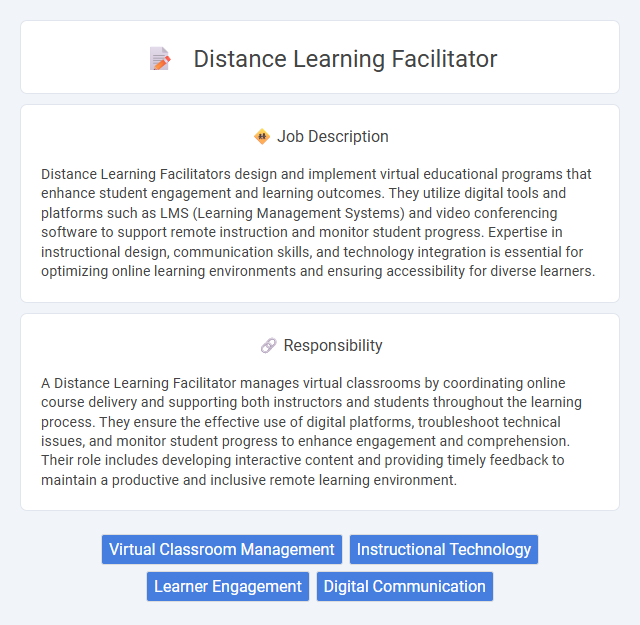
Distance Learning Facilitators design and implement virtual educational programs that enhance student engagement and learning outcomes. They utilize digital tools and platforms such as LMS (Learning Management Systems) and video conferencing software to support remote instruction and monitor student progress. Expertise in instructional design, communication skills, and technology integration is essential for optimizing online learning environments and ensuring accessibility for diverse learners.
Individuals who are self-motivated and possess strong communication skills are likely to be well-suited for the role of a Distance Learning Facilitator. Those comfortable with technology and able to manage time effectively may find greater success in this position. People who prefer structured, in-person interaction might struggle with the remote nature of facilitating distance education.
Qualification
A Distance Learning Facilitator must possess strong expertise in instructional design, e-learning platforms such as Moodle or Blackboard, and excellent communication skills tailored for virtual environments. A bachelor's degree in education, instructional technology, or a related field is typically required, with certifications in online teaching or digital pedagogy preferred. Experience in managing remote classrooms, assessment tools, and student engagement strategies is essential for ensuring effective distance education delivery.
Responsibility
A Distance Learning Facilitator manages virtual classrooms by coordinating online course delivery and supporting both instructors and students throughout the learning process. They ensure the effective use of digital platforms, troubleshoot technical issues, and monitor student progress to enhance engagement and comprehension. Their role includes developing interactive content and providing timely feedback to maintain a productive and inclusive remote learning environment.
Benefit
Distance Learning Facilitators likely enhance student engagement by providing personalized support and real-time feedback, which can improve learning outcomes. They probably offer flexible scheduling, allowing learners to balance education with personal and professional commitments effectively. This role may also promote the use of innovative educational technologies, contributing to a more dynamic and accessible learning experience.
Challenge
Distance learning facilitators likely face the challenge of maintaining student engagement and motivation in a virtual environment where direct interaction is limited. They probably need to develop innovative strategies to overcome technological barriers and varying levels of digital literacy among learners. Ensuring effective communication and timely support might be difficult due to the asynchronous nature of many online courses.
Career Advancement
Distance Learning Facilitators play a critical role in enhancing online education by managing virtual classrooms and supporting student engagement through digital tools, leading to strong potential for career advancement in educational technology and instructional design. Mastery in curriculum development, technology integration, and data-driven evaluation opens pathways to senior roles such as e-learning coordinator, instructional designer, or educational program manager. With the increasing demand for remote education, professionals in this field can leverage their expertise to transition into leadership positions or specialized consultancy roles within academic institutions and corporate training environments.
Key Terms
Virtual Classroom Management
Distance Learning Facilitators expertly manage virtual classrooms by utilizing advanced learning management systems (LMS) such as Moodle, Blackboard, and Canvas to organize course content and track student progress. They employ real-time communication tools like Zoom, Microsoft Teams, and Google Meet to foster interactive and engaging learning environments. Proficiency in moderating discussions, troubleshooting technical issues, and monitoring student engagement metrics is essential for optimizing online educational experiences.
Instructional Technology
Distance Learning Facilitators specialize in integrating instructional technology to enhance remote education by developing interactive online content and managing learning management systems (LMS) such as Canvas and Blackboard. They utilize tools like video conferencing software, digital collaboration platforms, and multimedia resources to facilitate engaging, accessible, and effective virtual learning experiences. Expertise in instructional design principles and educational technology enables these professionals to support educators and students in optimizing distance learning outcomes.
Learner Engagement
Distance Learning Facilitators enhance learner engagement by utilizing interactive tools and multimedia content to create immersive virtual classrooms. They monitor student participation and provide timely feedback to maintain motivation and support personalized learning paths. Leveraging data analytics, these facilitators identify engagement gaps and implement targeted strategies to boost retention and academic success.
Digital Communication
A Distance Learning Facilitator specializes in enhancing digital communication by leveraging online platforms to connect educators and students effectively. Mastery in virtual meeting tools, asynchronous discussion management, and multimedia content delivery ensures seamless interaction and engagement in remote learning environments. Proficiency in digital collaboration technologies supports real-time feedback and fosters a dynamic educational experience across diverse geographic locations.
 kuljobs.com
kuljobs.com